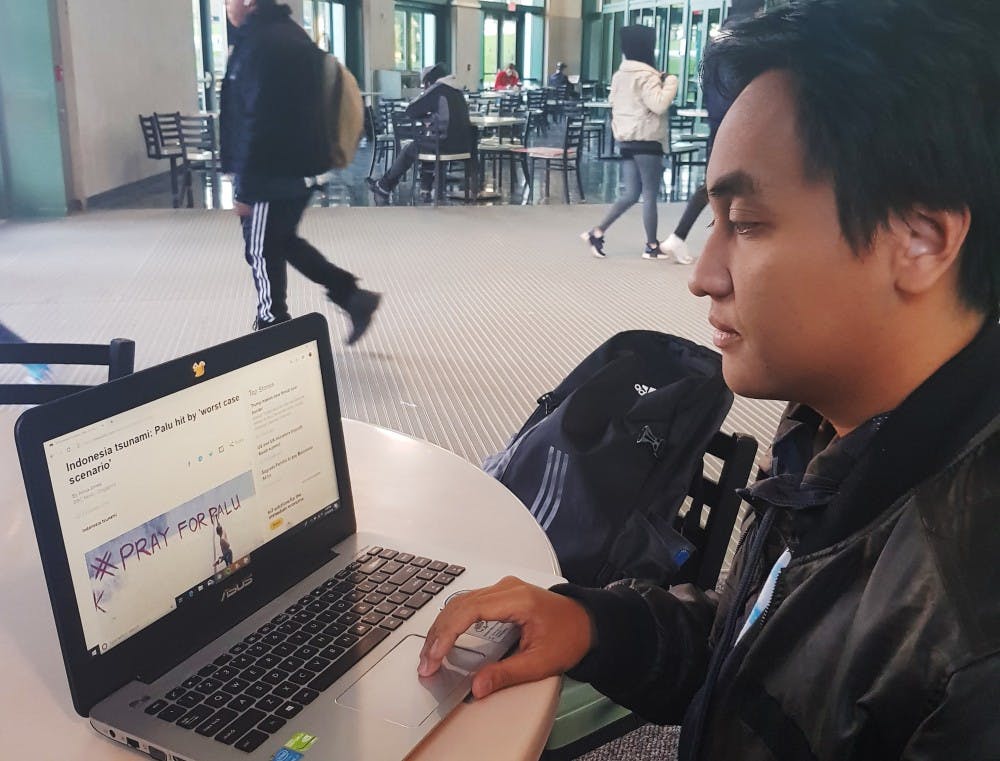On Sept. 28, a 7.5 magnitude earthquake hit the Indonesian island of Sulawesi. The earthquake triggered a roughly 10-foot-high tsunami. The tsunami struck land and hit Palu, Indonesia.
The official death toll, as of Oct. 17, is 2,100, according to a report by the World Health Organization. Six hundred eighty people are missing, according to the report.
A number of Indonesian students across UB are upset by news of the disaster.
Givary Muhammad, a junior finance major, is the president of the Indonesian Student Association. He comes from Java, an island in Indonesia. He lived with his family in the suburbs of Jakarta, the capital and largest city of Indonesia. An Indonesia native, he lived there for 16 years before moving to the U.S. in 2014.
When Muhammad heard the news of the disaster back home, he was devastated.
“As an Indonesian myself, I am sad and upset because I couldn’t offer my help to them due to [my] distance,” Muhammad said.
“I have a number of my friends back there and they readily assist the disaster relief and I’m here, thousands of miles away, just to see my fellow Indonesians suffer from the disaster.”
The National Disaster and Mitigation Agency said the tsunami was the main cause of death for many, apart from other causes such as building collapses, according to The Jakarta Post.
The Central Sulawesi administration declared a 14-day state of emergency, from Sept. 28 to Oct. 11.
The Indonesian government pledged relief funds, equivalent to $37.6 million U.S. dollars, according to The Jakarta Post.
Joseph Imanuel, a junior business administration major, said although he’s well aware that Indonesia is highly prone to natural disasters, he was surprised by the scale of damage to Palu.
“I just did not expect this much damage happening to Palu. All I could do was to give my prayers to the families,” he said.
Imanuel is from Tangerang, Indonesia. He spent 17 years of his life there before coming to the United States, in 2016, to pursue his associate's degree in Washington. He said the area where he grew up in is not prone to natural disasters, so he and his family did not experience any while living there.
Muhammad said members of Indonesian SA have prayed for people back home and have helped raise awareness for the disaster on Facebook. He said members have unitedly searched for GoFundMe pages and charity websites for the disaster.
“We, the Indonesian SA, as a representative of Indonesians in UB, would like to express our deepest condolences. We hope a speedy recovery for the survivors. We will try our best to share a little bit of what we have,” Muhammad said.
“It is heartbreaking that we couldn’t help our fellow Indonesians directly. We felt the call to help rebuild and to send relief efforts. We felt that we have lost someone we loved. Unfortunately, we couldn’t be physically there. Our prayers are with all the survivors.”
UB’s ISA is a part of the Indonesian Student Associations of the United States, which is translated from the Bahasa Indonesia name of the group: “Persatuan Mahasiswa Indonesia di Amerika Serikat.”
Muhammad said ISA is in contact with Indonesian diplomats and embassy workers in New York City and Washington D.C. He said he is constantly contacting presidents from other Indonesian student groups across the country, to help give as much aid as possible.
While Muhammad was fortunate enough to not have lived near volcanoes, he said that he experienced the horror of earthquakes. He said that since Indonesians are not trained in disaster-preparedness for earthquakes and do not receive real-time warnings from authorities, it is usually a scene of panic when an earthquake strikes.
Indonesian authorities have called off search operations, according to an Oct. 11 CNA report. This has angered many residents, CNA reported, as they have yet to find their loved ones and do not want to give up searching anytime soon.
As of Oct. 17, at least 686 remain missing after the disaster.
Indonesian students such as Immanuel, said they believe the Indonesian government has been doing a good job in handling this issue.
Imanuel said he’s glad the country is focusing on post-disaster relief rather than politics.
“Indonesia was in the middle of a presidential campaign and I was so happy to see my president prioritize the evacuation and support for the people, rather than campaigning for his re-election,” Imanuel said.
Shamini Priya Gopalakrishna is a contributing writer and can be reached at features@ubspectrum.com.





